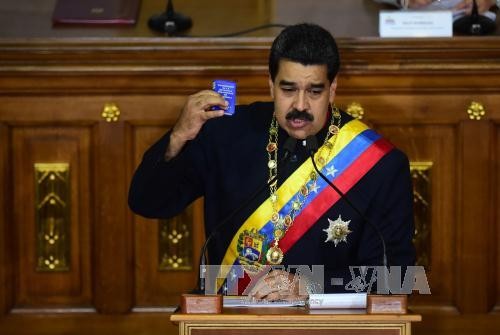 Venezuelan President Nicolas Maduro addressed the Assembly meeting in Caracas on August 10 (Photo: AFP/VNA) Venezuelan President Nicolas Maduro addressed the Assembly meeting in Caracas on August 10 (Photo: AFP/VNA) |
President Maduro announced victory after 8 million people went to the polls, a 41.5% voter turnout, according to the National Election Council. Maduro had said a new National Constituent Assembly was the only way to restore order after months of violent demonstrations.
Internal instability
Although President Maduro claimed victory, the opposition rejected the result, saying only 12% of voters went to the polls. The Constitution requires a minimum of 15%. Henrique Capriles, Governor of Miranda State and leader of the opposition, called on his supporters to stage more demonstrations after having boycotted the election. From 2013 to 2017, Venezuela’s GDP has fallen 40% and national incomes has fallen 51%. To deal with 720% inflation, Maduro has tripled the basic salary since the beginning of the year. More than 82% of the population are suffering from poverty and food shortage.
In January, 2016, the opposition took control of the parliament setting off a political crisis. Escalating violence over the past 4 months has claimed the lives of 100 people.
Mounting tensions with Latin American neighbors
Venezuela’s political struggles spilled beyond its border when the Peruvian government convened an emergency meeting on August 8 of the Foreign Ministers of 17 Latin American countries, who released a Lima Declaration refusing to recognize Venezuela’s National Constituent Assembly. Peruvian Foreign Minister Ricardo Luna refused to attend the Summit of the Community of Latin American and Caribbean States called by the Venezuelan President. Saul Ortega, a member of the National Constituent Assembly rejected the Lima Declaration, calling it an intervention into Venezuela’s internal affairs. He criticized the Mercosur for suspending Venezuela’s membership. Relations between Venezuela and Peru worsened when Peru expelled Venezuela’s Ambassador to Lima, Alfredo Molero Bellavia.
Opposing US intervention
On August 11, US President Donald Trump said the US has many options for Venezuela, including military intervention if necessary. Venezuelan Foreign Minister Jorge Arreaza responded that Trump’s bold threat aims to push Latin America and the Caribbean toward dispute and instability. He said Trump’s threat directly challenges Venezuela’s peace, stability, independence, territorial integrity, sovereignty, and self-determination. Many Venezuelans appear to agree that Trump’s words threaten their country’s sovereignty.
A possible US military intervention has made Latin American countries worried, even those who have criticized President Maduro. Peru said the US President’s threat defies UN rules. Foreign Secretary Luis Videgaray expressed Mexico’s position in a Twitter post: “The crisis in Venezuela can’t be resolved through military action, internally or externally.” Cuba, Bolivia, Ecuador, and Nicaragua say they will stand by Venezuela.